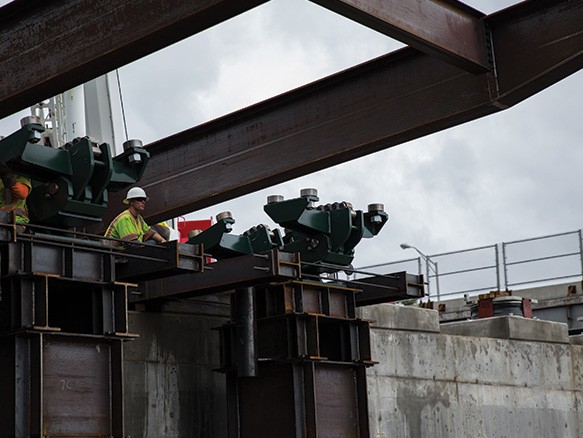
300 Ton Rollers with Rocker Tops launch three spans of Bridge over live commuter rail line.

The Tappan Zee bridge opened in 1955 and was considered a vital main crossing for residents, commuters, travelers and commercial traffic. By 2016, the traffic on the bridge had exceeded the amount that it was designed to support. The cost to maintain the bridge over recent years rivaled the cost of a new bridge and did not help with the traffic conditions so the decision was made to retire the bridge and build a new crossing.
Hilman Rollers were used during the construction to launch three spans of the bridge over a live commuter rail line (Metro North). Each Hilman Roller was rated at 300 metric ton capacity and fitted with accu-roll guidance (to maintain alignment) and a rocker. The rollers were positioned inverted and positioned on the abutment and piers to launch the superstructure.
The new bridge is one of the largest bridges in New York State history and one of the widest cable-stayed structures of its kind in the world. It will hold eight traffic lanes causing less congestion. There are four emergency lanes as well as a state-of-the-art traffic monitoring system. It is also mass-transit ready and features a path for pedestrians and cyclists.
Tappan Zee Constructors, LLC designed and built the bridge along engineering and constructions firms including Fluor, American Bridge, Granite and Traylor Brothers. Key design firms HDR, Buckland & Taylor, URS and GZA were also involved. McNary Bergeron provided construction engineering services to support the project with the erection of the new bridge. The New York State Thruway Authority and the State Department of Transportation worked closely on this project with TZC.